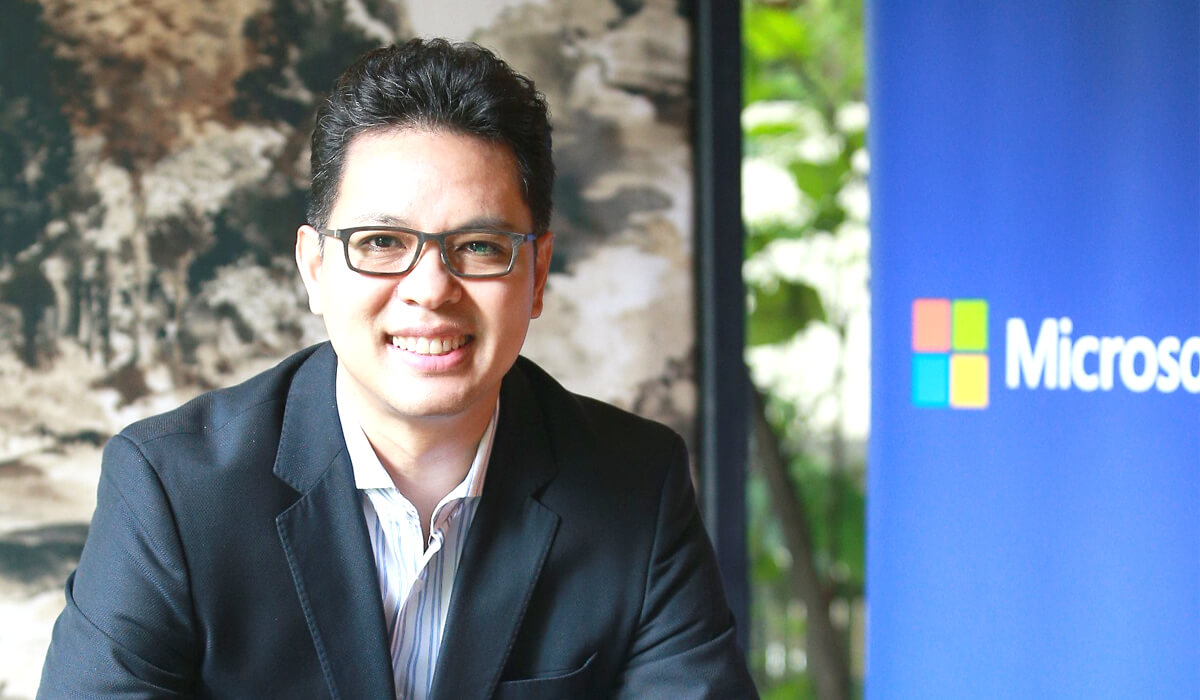
Thanawat Suthampan, the IT guru joined Microsoft Thailand in June 2017 as the Managing Director. He was previously known as an IT expert with experience working with IBM Singapore and Hewlett Packard (Thailand). His recent position is the Managing Director of Microsoft Thailand Co Ltd.
Wherever he works, the principle of working with others is to encourage everyone to express their opinion and dare to disagree. He wants to make his staff realize that he’s not an executive with top-down approach but prefers to listening to all facts and information before analyzing to find the best solutions or find further development.
He told Forbes Thailand that Microsoft Thailand products are to provide 4 major solutions.
They are
1) Modern Workplace: allowing employees to work everywhere with all devices such as Microsoft Office, Microsoft OneDrive, Microsoft OneNote and Microsoft Teams;
2) Business Application: solutions for financial management, sales, personnel recruitment and call center;
3) Applications and Infrastructure: such as cloud and regional data center. It has recently Microsoft Azure Stack in form of hybrid cloud which enables organization to create and use the application on cloud and organizational system; and
4) Artificial Intelligence (AI) and data such as AI in Microsoft Azure.
“Data and customer relations are what we have while others do not. These two elements enable us to find and provide services and products that better meet customers’ needs. This is the strengths of Microsoft which has to go along with our four key solutions simultaneously as they are strongly related to each other, “said Thanawat.
Thanawat started his first job with IBM’s Accounting Department as a Finance Sales. After completing MBA from California State University, USA, he joined a finance company and joined IBM again as a corporate acquaintance. He is equipped with knowledge in financial industry handling sales and services as well as served as Corporate Communications & Telecommunication (TELCO) in 10 Southeast Asian countries at Singapore office. He was in charge of handling large corporate clients, both public and private sectors, and general client like Hewlett-Packard (Thailand).
The new solutions allow Microsoft Thailand to bring technology-driven products to strengthen the clients’ businesses be they the major players in the telecommunications, banking, retails and general customers to have more business opportunities. He said that he wants Microsoft Thailand to double its growth within three years with Microsoft’s “Good to Great” strategy, rather than focusing solely on corporate success.
Microsoft Thailand must focus on the success of partners and customers as well including enhancing skills or motivating users to get to know all four solutions of Microsoft that they are able to boost competitiveness and expand business opportunities. Nowadays, some partners may know only one solution, or some client may not yet optimize the product that they bought. “We then have to think and help them to optimize to achieve the best results. It also wants to bring new solutions to digital transformation which is the direction of today’s organization.
Digital transformation is able to drive the GDP of Thailand to grow by 3.7% per annum, which is 0.4% higher than the anticipatation of the World Bank, or accounting for $9 billion or about 29.5 billion baht. This is the figure which reflect the business opportunities.
For the value of digital transformation opportunities that Microsoft has been able to help customers around the world, it was worth $25 billion in 1995, $250 billion in 2005, $ 2.5 trillion in 2015, and $ 4.5 trillion in 2016 respectively.
In 2560, Microsoft’s Dynamics 365 subscriber base grew by 40% from the year before, with 53 million active Xbox Live subscribers, 100 million Office 365 subscribers, and 500 million LinkedIn subscribers. The total sales was $89.95 trillion and the total revenue for the first quarter of 2018 was $24.5 billion.
Reference: Forbes

